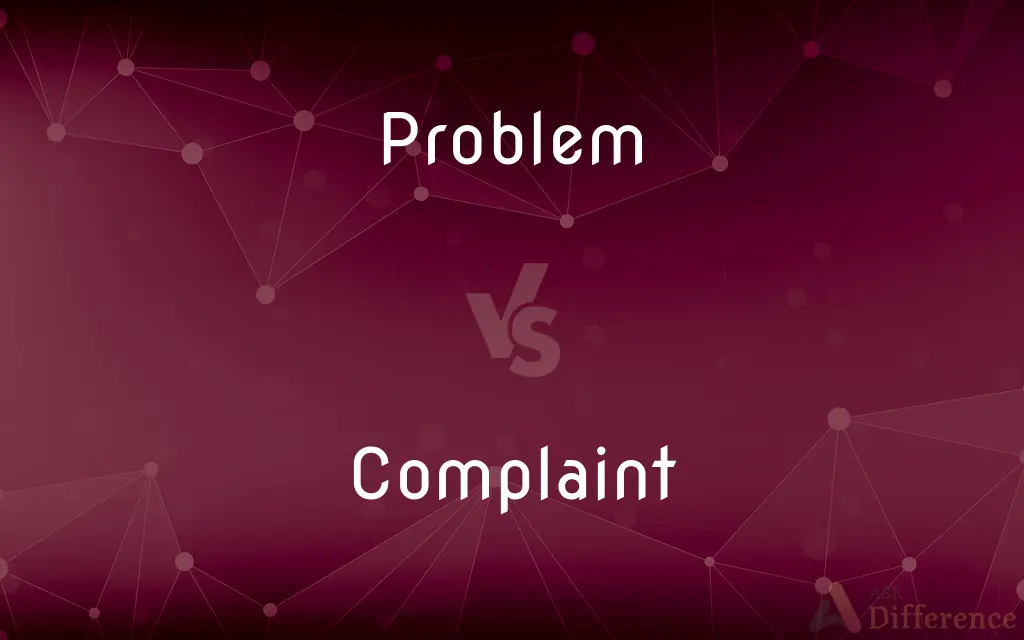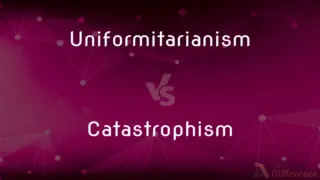Problem vs. Complaint — What's the Difference?
By Fiza Rafique & Urooj Arif — Updated on April 3, 2024
A problem is a general issue needing resolution, focusing on objective difficulties, while a complaint is a specific expression of dissatisfaction, often subjective and personal.

Difference Between Problem and Complaint
Table of Contents
ADVERTISEMENT
Key Differences
A problem refers to any issue or obstacle that impedes progress or causes difficulty, requiring a solution to overcome it. On the other hand, a complaint is an expression of dissatisfaction or grievance about a situation, service, or product, usually voiced by an individual or group.
While problems can exist without being acknowledged or articulated by people, complaints are inherently about articulation, often aimed at someone responsible for resolving the issue. Whereas problems might not always have a clear source or solution, complaints typically identify a specific cause and sometimes suggest a desired resolution.
Problems are usually identified through objective analysis and can affect a broad range of situations or operations. In contrast, complaints are subjective and reflect personal experiences, expectations, and perceptions, making them inherently tied to individual viewpoints.
Solving a problem often involves a systematic approach to identify its root causes and implement solutions. Conversely, addressing a complaint usually focuses on resolving the dissatisfaction expressed by the complainant, which may or may not require solving a broader problem.
Problems can inspire innovation and improvement as they push for solutions that address the underlying issues. Complaints, while they can highlight specific problems, primarily serve to inform service providers or manufacturers of specific shortcomings or failures from the perspective of the user or consumer.
ADVERTISEMENT
Comparison Chart
Nature
General issue needing resolution
Specific expression of dissatisfaction
Focus
Objective difficulties
Subjective and personal experiences
Identification
Through analysis
Voiced by individuals
Scope
Can be broad, affecting many
Usually specific and personal
Solution Approach
Systematic, addressing root causes
Focuses on resolving dissatisfaction
Outcome
Can inspire innovation
Highlights specific shortcomings
Compare with Definitions
Problem
Can affect many aspects of life or work.
The software bug was a problem for users and developers alike.
Complaint
Reflects personal experience.
His complaint about the noise levels highlighted his sensitivity.
Problem
Requires a solution.
Solving the traffic congestion problem required a new city planning strategy.
Complaint
A voiced dissatisfaction with a service or product.
The customer’s complaint was about the laptop’s battery life.
Problem
Often identified through analysis.
Researchers identified pollution as a problem for the river's ecosystem.
Complaint
Serves to inform of a failure or shortcoming.
The complaints about the app were mainly about its user interface.
Problem
An obstacle that needs to be solved.
The math problem was challenging but solvable with the right formula.
Complaint
Often seeks a specific resolution.
The complaint requested a refund for the late delivery.
Problem
Exists independently of human perception.
Climate change is a problem affecting global ecosystems.
Complaint
Can be formal or informal.
She filed a formal complaint against the poor customer service.
Problem
A matter or situation regarded as unwelcome or harmful and needing to be dealt with and overcome
The problem of ageism in Hollywood
They have financial problems
Complaint
In legal terminology, a complaint is any formal legal document that sets out the facts and legal reasons (see: cause of action) that the filing party or parties (the plaintiff(s)) believes are sufficient to support a claim against the party or parties against whom the claim is brought (the defendant(s)) that entitles the plaintiff(s) to a remedy (either money damages or injunctive relief). For example, the Federal Rules of Civil Procedure (FRCP) that govern civil litigation in United States courts provide that a civil action is commenced with the filing or service of a pleading called a complaint.
Problem
An inquiry starting from given conditions to investigate or demonstrate a fact, result, or law.
Complaint
An expression of pain, dissatisfaction, or resentment.
Problem
A question to be considered, solved, or answered
Math problems.
Complaint
A cause or reason for complaining; a grievance
What is your complaint?.
Problem
A situation, matter, or person that is hard to deal with or understand
Was having problems breathing.
Considered the main problem to be his boss. See Usage Note at dilemma.
Complaint
A bodily disorder or disease; a malady or ailment.
Problem
A personal matter that causes one difficulty or needs to be dealt with
Felt her tyrannical boss had deep-seated problems.
Complaint
The symptom or distress about which a patient seeks medical assistance.
Problem
A misgiving, objection, or complaint
I have a problem with his cynicism.
Complaint
A formal statement initiating a lawsuit by specifying the facts and legal grounds for the relief sought.
Problem
Difficult to deal with or control
A problem child.
Complaint
A formal charge, made under oath, of the commission of a crime or other such offense.
Problem
Dealing with a moral or social problem
A problem play.
Complaint
The act of complaining.
Problem
A difficulty that has to be resolved or dealt with.
She's leaving because she faced numerous problems to do with racism.
Complaint
A grievance, problem, difficulty, or concern.
I have no complaints about the quality of his work, but I don't enjoy his company.
Problem
A question to be answered, schoolwork exercise.
Study hard, but don't overdo it. The problems in the exam won't be difficult to solve.
Complaint
(legal) In a civil action, the first pleading of the plaintiff setting out the facts on which the claim is based;
The purpose is to give notice to the adversary of the nature and basis of the claim asserted.
The purpose is to give notice to the adversary of the nature and basis of the claim asserted.
Problem
A puzzling circumstance.
Complaint
(legal) In criminal law, the preliminary charge or accusation made by one person against another to the appropriate court or officer, usually a magistrate.
However, court proceedings, such as a trial, cannot be instituted until an indictment or information has been handed down against the defendant.
However, court proceedings, such as a trial, cannot be instituted until an indictment or information has been handed down against the defendant.
Problem
Objection.
You got a problem with that?
Complaint
A bodily disorder or disease; the symptom of such a disorder.
Don't come too close; I've got this nasty complaint.
Problem
Difficulty in accepting or understanding or refusal to accept or understand.
You made your best honest effort; if they judge you harshly, that’s their problem, not yours.
Complaint
Expression of grief, regret, pain, censure, or resentment; lamentation; murmuring; accusation; fault-finding.
I poured out my complaint before him.
Grievous complaints of you.
Problem
(climbing) A set of moves required to complete a climb.
Complaint
Cause or subject of complaint or murmuring.
The poverty of the clergy in England hath been the complaint of all who wish well to the church.
Problem
(of a person or an animal) Difficult to train or guide; unruly.
Complaint
An ailment or disease of the body.
One in a complaint of his bowels.
Problem
Causing a problem; problematic; troublesome.
Complaint
A formal allegation or charge against a party made or presented to the appropriate court or officer, as for a wrong done or a crime committed (in the latter case, generally under oath); an information; accusation; the initial bill in proceedings in equity.
Problem
A question proposed for solution; a matter stated for examination or proof; hence, a matter difficult of solution or settlement; a doubtful case; a question involving doubt.
Complaint
An often persistent bodily disorder or disease; a cause for complaining
Problem
Anything which is required to be done; as, in geometry, to bisect a line, to draw a perpendicular; or, in algebra, to find an unknown quantity.
Complaint
(formerly) a loud cry (or repeated cries) of pain or rage or sorrow
Problem
A state of difficulty that needs to be resolved;
She and her husband are having problems
It is always a job to contact him
Urban problems such as traffic congestion and smog
Complaint
An expression of grievance or resentment
Problem
A source of difficulty;
One trouble after another delayed the job
What's the problem?
Complaint
(civil law) the first pleading of the plaintiff setting out the facts on which the claim for relief is based
Problem
A question raised for consideration or solution;
Our homework consisted of ten problems to solve
Complaint
(criminal law) a pleading describing some wrong or offense;
He was arrested on a charge of larceny
Common Curiosities
What defines a complaint?
A complaint is an expression of dissatisfaction or a grievance about a particular situation, service, or product.
Can a complaint indicate a problem?
Yes, complaints can highlight specific problems from the perspective of the user or consumer.
What is a problem?
A problem is an obstacle or issue that requires a solution to overcome.
What is the focus of addressing complaints?
Addressing complaints focuses on resolving the dissatisfaction expressed by the complainant.
Can a problem exist without anyone complaining about it?
Yes, problems can exist objectively without anyone voicing complaints about them.
How are problems solved?
Problems are usually solved through a systematic approach that includes identifying root causes and implementing solutions.
Is every complaint indicative of a problem?
Not necessarily; some complaints may be based on personal preferences or misunderstandings, not objective problems.
What is the difference between a problem and a challenge?
A challenge is often seen as a problem that encourages growth and development, while a problem is more broadly any issue needing resolution.
How can businesses benefit from complaints?
Businesses can benefit from complaints by using them to identify and rectify specific issues, improving customer satisfaction and product quality.
Why is it important to differentiate between problems and complaints?
Differentiating helps in addressing them appropriately; problems need solutions, while complaints require addressing dissatisfaction.
Can addressing complaints lead to problem-solving?
Yes, addressing complaints can lead to identifying and solving broader problems, ultimately improving services or products.
Are all problems solvable?
Not all problems have straightforward solutions; some may require long-term efforts or changes in perspective.
How should organizations respond to complaints?
Organizations should listen, understand the specific dissatisfaction, and take appropriate action to resolve it.
How can an individual effectively communicate a complaint?
By being specific about the issue, explaining how it affects them, and suggesting a desired resolution if possible.
What role do complaints play in quality control?
Complaints play a crucial role in quality control by identifying areas where products or services do not meet customer expectations.
Share Your Discovery

Previous Comparison
Pigeon vs. Seagull
Next Comparison
Uniformitarianism vs. CatastrophismAuthor Spotlight
Written by
Fiza RafiqueFiza Rafique is a skilled content writer at AskDifference.com, where she meticulously refines and enhances written pieces. Drawing from her vast editorial expertise, Fiza ensures clarity, accuracy, and precision in every article. Passionate about language, she continually seeks to elevate the quality of content for readers worldwide.
Co-written by
Urooj ArifUrooj is a skilled content writer at Ask Difference, known for her exceptional ability to simplify complex topics into engaging and informative content. With a passion for research and a flair for clear, concise writing, she consistently delivers articles that resonate with our diverse audience.















































